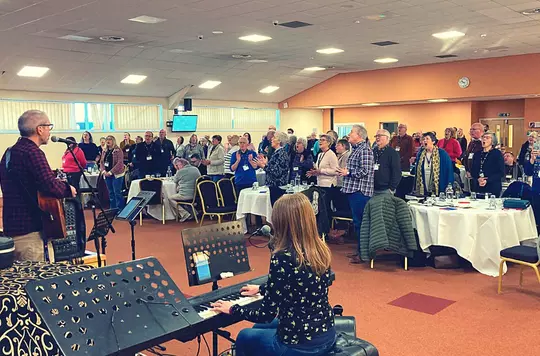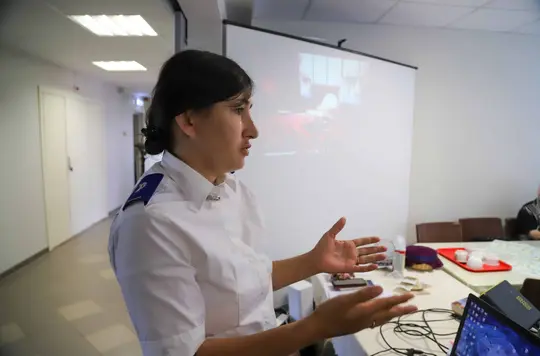27 February 2023
Live lives worthy of God: How can we develop disciples?
Lieut-Colonel Jayne Roberts
Lieut-Colonel Jayne Roberts considers how we can nurture believers.
Key text
‘Jesus is coming back – Thessalonian church is ready!’ If newspapers had been printed in the first century, this might have been the headline in the Macedonian Echo.
This week we study a theme from a letter written to a church that had a distinctive outlook. In the face of opposition, they were strong in their faith and eagerly looked for Christ’s return. I wonder what it was in Paul’s preaching and teaching that captured their hearts and stirred their imagination to respond in a way that no other church had done previously.
Pause and reflect
- What is distinctive about the outlook of your corps or church?
- What are you focused on?
Paul wrote this letter after Timothy reported back to him following a visit to the Thessalonian church that they had planted.
Paul and his companions had first travelled to Thessalonica from Philippi, where they had been mistreated and forced to leave by those who opposed the gospel. Undeterred by this, Paul, Silas and Timothy continued to preach the word of God, and a strong faith community was established among the Thessalonians (see v2). Later, they too would experience persecution.
Paul commends these Christians for their response to the gospel, which had become a byword in the region of Macedonia: ‘They tell how you turned to God from idols to serve the living and true God, and to wait for his Son from Heaven, whom he raised from the dead – Jesus, who rescues us from the coming wrath’ (1 Thessalonians 1:9 and 10).
Today, in many parts of the world, there is opposition to the gospel and Christians are persecuted for declaring their faith.
Pause and reflect
- Does it require a different kind of courage to stand for Christ in a context where there is great freedom of religious expression?
Apostles, who were faithful to God’s call to declare the gospel, planted the church at Thessalonica. Paul is very clear that he preached not to flatter or deceive, or for monetary gain. He writes: ‘We speak as those approved by God to be entrusted with the gospel. We are not trying to please people but God, who tests our hearts’ (v4).
As an apostle, Paul could have claimed some financial support for his ministry. However, Paul and his companions preferred to support themselves in order not to be a burden. They worked hard and paid their own way (see v9).
In the Tyndale New Testament Commentaries, Leon Morris explains that Paul’s courage and confidence are rooted in his assurance that ‘the gospel is not of human origin … our age can do with the reminder that the Christian faith is not the accumulated wisdom of pious souls nor the insight of men of religious genius but the divine plan for dealing with man’s sin.’
Paul’s integrity is evident, as is his sense of accountability to God, not people. In this letter we also find an unusually strong expression of pastoral care alongside the preaching; both a maternal (see vv7 and 8) and a paternal (see vv11 and 12) tenderness was the spirit in which the new believers were nurtured. They were regarded as precious children. Paul spoke with them personally and says, ‘we cared for you’ and ‘we loved you’ (v8). There was an individual approach for he refers to ‘each of you’, not ‘all of you’.
It takes time and energy and patience to care for people and to listen on a one-to-one basis. We remember that Jesus took time to be with individuals as well as addressing great crowds. The personal encounters, such as those described in John 3 and John 4, were life-changing, life-giving conversations. Both Nicodemus the Pharisee and the anonymous Samaritan woman found their lives dramatically changed once they had spent time with Jesus.
Pause and reflect
- Who has had an impact on your life through sharing a personal conversation?
- Who might be encouraged by you taking time to ask them how they are growing spiritually?
As parents of four adult children, my husband and I often say that our aim was to give our children roots and wings. We look back on many happy, busy years as a family of six. We also remember how we felt as they each went to live independently. It is a blessing to know they are engaged in purposeful work and pursuing all kinds of adventures – although it was a surprise when our son moved to Brazil seven years ago!
I hope that Paul was sometimes similarly surprised by his spiritual children and rewarded as he saw those who came to faith grow into strong active disciples of Jesus and move out in the power of the Holy Spirit.
Paul explains the purpose of the careful spiritual parenting that he, Silas and Timothy engaged in. It was to encourage the believers to: ‘Live lives worthy of God, who calls you into his Kingdom and glory’ (v12).
This theme is echoed in his words to the believers in Ephesus as he spells out more explicitly what is required by this calling: ‘I urge you to live a life worthy of the calling you have received. Be completely humble and gentle; be patient, bearing with one another in love. Make every effort to keep the unity of the Spirit through the bond of peace’ (Ephesians 4:1–3).
As Christians we both participate in the Kingdom of God now and wait for the return of Christ when we will share his glory.
Pause and reflect
- How will we respond to the challenge to ‘live lives worthy of God’?
- What does it mean to be called into his Kingdom and glory?
Bible study by

Lieut-Colonel Jayne Roberts
Secretary for Spiritual Life Development, THQ
Discover more

Austen Hardwick highlights the importance of the relationship between young people and leaders.

Territorial Ecumenical Officer Lieut-Colonel Jonathan Roberts reports from this year’s Encounter Prayer Gathering.

Resources to help transform our hearts this Lent, including material for Palm Sunday.

